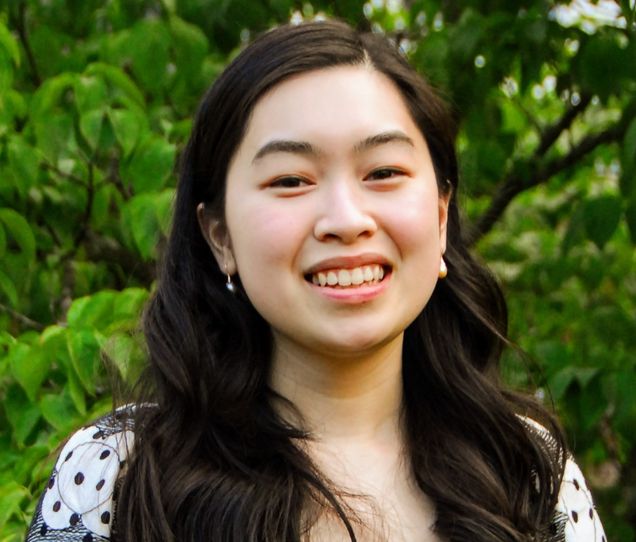PhD Student Spotlight: Michelle Nguyen
 Michelle Nguyen is a PhD candidate in the Department of Pharmacology, Physiology & Biophysics. She works in the lab of Associate Professor of Microbiology John Connor at the National Emerging Infectious Diseases Laboratory (NEIDL). Michelle’s research studies how SARS-CoV-2 interacts with the inner lining of blood vessels in order to understand the effect of the virus on the endothelium and endothelial cells. Michelle is a recipient of a Draper Fellowship, which will allow her to conduct her own research under the supervision of a University faculty advisor and a Draper technical staff supervisor. Learn more about Michelle and her fellowship below!
Michelle Nguyen is a PhD candidate in the Department of Pharmacology, Physiology & Biophysics. She works in the lab of Associate Professor of Microbiology John Connor at the National Emerging Infectious Diseases Laboratory (NEIDL). Michelle’s research studies how SARS-CoV-2 interacts with the inner lining of blood vessels in order to understand the effect of the virus on the endothelium and endothelial cells. Michelle is a recipient of a Draper Fellowship, which will allow her to conduct her own research under the supervision of a University faculty advisor and a Draper technical staff supervisor. Learn more about Michelle and her fellowship below!
Tell me about your journey to Boston University. Are you from the Boston area?
I grew up in Medford, Massachusetts. I went to UMass Lowell, where I received my bachelor’s degree in biomedical engineering. Graduate school wasn’t on my radar for the most part of college. In my junior year, my genetics professor, Dr. Sarah Rozelle, who also happens to be GMS alumna, emailed me about the BU BEST BET program. I applied and participated in the program during spring break. I learned about [Pharmacology, Physiology & Biophysics] program here at GMS. After interacting with the students and faculty, I thought that I found a good fit and was happy to join the Department of [Pharmacology, Physiology & Biophysics]. Now, I’m a third year PhD Candidate in Dr. John Connor’s lab over at the National Emerging Infectious Diseases Laboratories.
Tell me about your research. What are you studying?
I study how our blood vessels become damaged and form nasty blood clots in patients with severe COVID-19. I am interested in how SARS-CoV-2 interacts with the inner lining of our blood vessels which plays a big role in how our blood vessels function. My goal is to understand how the virus could directly breach endothelium or indirectly cause the endothelial cells to not function properly. I apply a mix of cell culture approaches and microfluidic approaches, called organ-on-chip technologies, to model how the virus interacts with human blood vessels.
What drove you to pursue this career & research path?
I pivoted from my undergraduate training but was hoping to bring my engineering background into research. I matriculated in Pharmacology during the pandemic. At the time, I think many researchers were interested in applying their knowledge to address infectious diseases. In some ways, I think the pandemic catalyzed using unorthodox methods in virology. Joining the Draper Scholar Program, I am very fortunate to carve my path and found out that I really like virology. I don’t think my path would have been possible with support from both my Draper Advisors and my PI.
What was the process for receiving the Draper Fellowship? Did you have to apply? What was that process like?
I applied to the Draper Scholar Program through their website in my senior year of college while I was applying to graduate programs. This application included a statement of purpose, transcripts, university application status, and references. During the pandemic, the interview process was over the phone, which might be different now. Shortly afterwards, I received noticed of the award.
What do you hope to accomplish as a Draper Scholar? How do you feel having won the fellowship?
I am aspiring to develop and translate organ-on-chip technologies to high containment to answer questions about infectious diseases. I have never driven something of this caliber before. Having been a Draper Scholar for a few years now, it has been a whirlwind and I am grateful for the journey – even the rough parts. It requires me to show and build on my learning agility and mental fortitude. I feel a lot of purpose.
Have you faced any unexpected challenges in your PhD program? How did you overcome those?
This might sound unexpected, but I thought juggling coursework and driving a research project was hard. I learned that study habits that I had built in college weren’t entirely translatable in the biomedical sciences. There also wasn’t a low-risk way to test out different study strategies before exams. I would get discouraged seeing where I stood on histograms showing distribution of grades and felt like my classmates just lapped me in and outside of class. I decided to stop worrying about my pace and accepted that I learn differently. I went to tutoring, worked with my professors, and PI and eventually the hard work paid off. I also attribute my success to the strong camaraderie and work ethic of my cohort during the pandemic. I think when you see others working hard, it inspires you to do the same.
Do you have any advice for incoming GMS students?
Mentors can come from anywhere – your PI, someone else in your field, a classmate, a professor, or even someone you see on the bus. Whatever difficulty you encounter, someone else most likely has experienced it before. While it’s important to be able handle adversity on your own, it doesn’t necessarily mean you always have to do it alone. Also, being kind is important.